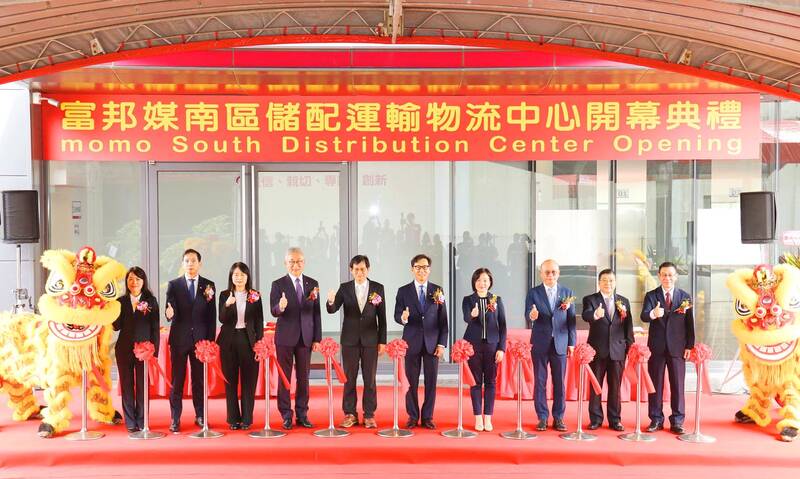Momo.com Inc (富邦媒體) opened its southern distribution center in Tainan’s Sinshih District (新市) yesterday, as the e-commerce operator continues to strengthen its logistics infrastructure, aiming to further differentiate its service not only from online competition, but also brick-and-mortar retailers.
Construction of the southern distribution center on a site covering 24,500 ping (80,972.5m2) started in 2021.
The company plans to build six floors above ground and one below, investing about NT$3 billion (US$92.3 million) in the center, Momo.com said in a statement.

Photo courtesy of Momo.com Inc
The new distribution center has the capacity to process 160,000 packages per day and could store as many as 3.4 million packages, the company said, expecting it to help shorten the lead time for packages delivered in Yunlin County, Chiayi County, Tainan, Kaohsiung and Pingtung County.
Apart from ensuring quality, speedy service for consumers in southern Taiwan, the new distribution center is expected to help achieve fair distribution of delivery tasks between northern and southern Taiwan and reduce distribution costs, while lowering energy consumption for transportation and cutting carbon emissions in the region, the company said.
In addition, the new center is expected to assist the development of local industries, as well as create 500 job opportunities in logistics, data analysis, research and development, and warehouse system in the region, it said.
Momo.com, which operates three platforms — online shopping, TV home shopping and catalog shopping — enjoys a steady share of 16.5 percent of Taiwan’s online retailing market, according to a Fubon Securities Investment Services Co (富邦投顧) estimate.
“With the launch of the southern distribution center, Momo’s warehouse area is estimated to have increased by 15 percent compared with the same period last year. The company’s market share is expected to increase through better logistics services, which will also strengthen its competitiveness,” Fubon Securities said in a statement on Nov. 5.
Momo.com early this month reported its third-quarter revenue hit a record NT$25.55 billion, up 1.9 percent year-on-year, thanks to its greater logistics efficiency and a wider range of product offerings compared with local peers.
However, lower consumer purchases, rising market competition and higher operating expenses earmarked for new businesses affected the company’s bottom-line, with net profit falling 11.2 percent to NT$666 million and earnings per share (EPS) dropping 11.1 percent to NT$2.64, lower than consensus estimates of NT$788 million in net profit and NT$3.27 for EPS, according to data compiled by Bloomberg.
Gross margin decreased 0.34 percentage points to 8.92 percent and operating margin fell 0.42 percentage points to 3.22 percent from a year earlier, company data showed.
Overall, Momo.com’s cumulative revenue in the first three quarters of this year hit a record NT$76.41 billion, up 3.5 percent annually, but net profit over the period fell 5.6 percent to NT$2.34 billion and EPS declined to NT$9.29 from NT$11.04, data showed.

In Italy’s storied gold-making hubs, jewelers are reworking their designs to trim gold content as they race to blunt the effect of record prices and appeal to shoppers watching their budgets. Gold prices hit a record high on Thursday, surging near US$5,600 an ounce, more than double a year ago as geopolitical concerns and jitters over trade pushed investors toward the safe-haven asset. The rally is putting undue pressure on small artisans as they face mounting demands from customers, including international brands, to produce cheaper items, from signature pieces to wedding rings, according to interviews with four independent jewelers in Italy’s main

Japanese Prime Minister Sanae Takaichi has talked up the benefits of a weaker yen in a campaign speech, adopting a tone at odds with her finance ministry, which has refused to rule out any options to counter excessive foreign exchange volatility. Takaichi later softened her stance, saying she did not have a preference for the yen’s direction. “People say the weak yen is bad right now, but for export industries, it’s a major opportunity,” Takaichi said on Saturday at a rally for Liberal Democratic Party candidate Daishiro Yamagiwa in Kanagawa Prefecture ahead of a snap election on Sunday. “Whether it’s selling food or

CONCERNS: Tech companies investing in AI businesses that purchase their products have raised questions among investors that they are artificially propping up demand Nvidia Corp chief executive officer Jensen Huang (黃仁勳) on Saturday said that the company would be participating in OpenAI’s latest funding round, describing it as potentially “the largest investment we’ve ever made.” “We will invest a great deal of money,” Huang told reporters while visiting Taipei. “I believe in OpenAI. The work that they do is incredible. They’re one of the most consequential companies of our time.” Huang did not say exactly how much Nvidia might contribute, but described the investment as “huge.” “Let Sam announce how much he’s going to raise — it’s for him to decide,” Huang said, referring to OpenAI

The global server market is expected to grow 12.8 percent annually this year, with artificial intelligence (AI) servers projected to account for 16.5 percent, driven by continued investment in AI infrastructure by major cloud service providers (CSPs), market researcher TrendForce Corp (集邦科技) said yesterday. Global AI server shipments this year are expected to increase 28 percent year-on-year to more than 2.7 million units, driven by sustained demand from CSPs and government sovereign cloud projects, TrendForce analyst Frank Kung (龔明德) told the Taipei Times. Demand for GPU-based AI servers, including Nvidia Corp’s GB and Vera Rubin rack systems, is expected to remain high,